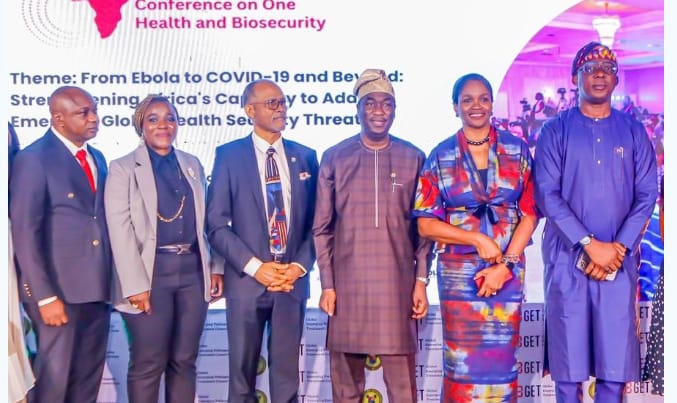…10th African One Health and Biosecurity Conference Addresses Pandemic Preparedness
It was the largest gathering, in recent times, of global experts, policymakers and stakeholders as the Global Emerging Pathogens Treatment (GET) Consortium, in partnership with Lagos State hosted the 10th African Conference on One Health and Biosecurity.
The two-day conference centers on Africa’s readiness to tackle global health threats under the theme: “From Ebola to COVID-19 and Beyond: Strengthening Africa’s Capacity to Address Emerging Global Health Security Threats.”
Lagos’ Biosecurity Commitment
In his opening remarks, Governor Babajide Sanwo-Olu, represented by Deputy Governor Dr. Obafemi Hamzat, emphasized Lagos’s commitment to strengthening healthcare infrastructure to counter biosecurity risks. “Lagos, with its dense and rapidly growing population, is especially susceptible to infectious outbreaks,” Sanwo-Olu stated, underscoring the need for Lagos to lead in biosecurity readiness as a model for the continent.
Key figures in attendance included former Governor Babatunde Raji Fashola, Central Bank Governor Olayemi Cardoso, Lagos Health Commissioner Prof. Akin Abayomi, Special Adviser on Health Dr. (Mrs) Kemi Ogunyemi, and GET Consortium’s COO Dr. Ayodotun Bobadoye. Their presence underscored biosecurity’s vital role in health, environmental sustainability, and national security.
Sanwo-Olu applauded the decade-long partnership between Lagos and GET, which has fostered biosecurity innovation in the city. He called for an Africa-centric approach to health security, advocating for local research, indigenous medical technology, and self-sufficiency in vaccines and medical supplies. Highlighting the importance of a holistic One Health approach, he stressed the need to integrate human, animal, and environmental health to combat interconnected threats.
Fashola’s Call for Coordinated Action
Former Governor Babatunde Fashola also spoke, advocating a united approach to health security. He noted that Africa’s rapid urbanization and population growth make the continent particularly vulnerable to biosecurity threats, making proactive planning essential for resilience. He praised Lagos State’s leadership and encouraged other African states to adopt similar measures, stressing that strong public-private partnerships are essential as governments alone cannot bear the full burden of health security.
Fashola urged investment in health research and data-driven policies, asserting that localized solutions are key to Africa’s resilience. He stressed that leveraging private sector expertise can enhance health systems across the continent, especially in low-resource settings.
Economic Perspectives
Addressing the conference, Central Bank of Nigeria (CBN) Governor Olayemi Cardoso highlighted the importance of economic resilience in health security. Represented by Dr. (Mrs.) Adenike Ojumu, Cardoso advocated for strengthening Africa’s health and economic systems to prevent destabilization during health crises. He emphasized the need for local production of essential medical supplies, public-private collaboration, and sustainable financing for health systems.
Cardoso also noted that a diversified economy is more resilient to external shocks, calling on African central banks to promote sectors such as technology, agriculture, and manufacturing. He urged regional cooperation and inclusive policies to support health security, particularly for vulnerable populations, and reaffirmed the CBN’s commitment to reducing inequalities and promoting economic resilience.
Biosecurity and Environmental Challenges
Lagos Health Commissioner Prof. Akin Abayomi addressed the dual threats of environmental degradation and pandemics, noting that zoonotic diseases pose significant risks to public health. He highlighted Lagos’s biodiversity and animal populations as constant sources of potential zoonotic outbreaks. Abayomi also cautioned that deforestation in Nigeria accelerates climate change, increasing biosecurity risks and health instability.
Abayomi warned that rapid urbanization in megacities like Lagos, while economically beneficial, also heightens vulnerability to disease spread. He called for integrating urban planning with biosecurity measures, emphasizing that environmental preservation is critical to health stability.
Building Resilience Through Community Engagement
Special Adviser to the Governor on Health, Dr. (Mrs.) Kemi Ogunyemi, reiterated Lagos’s commitment to building a resilient healthcare system. She emphasized the importance of community engagement, especially to counter misinformation during health crises. Reflecting on lessons from COVID-19, she underscored that empowering local leaders and promoting health literacy can prevent unrest and foster community-driven responses.
GET Consortium’s Role and Vision
Dr. Ayodotun Bobadoye, COO of GET Consortium, recounted the conference’s origins after the Ebola crisis and its mission to build capacity across Africa. The rising frequency of outbreaks on the continent, he said, underscores the need for platforms like this to develop indigenous solutions. He expressed pride in Lagos’s role as host and reaffirmed the consortium’s dedication to advancing proactive biosecurity across Africa.
With a decade of progress and collaboration, the 10th African Conference on One Health and Biosecurity continues to be a crucial forum for discussing policies, technological innovations, and regional partnerships. As the conference progresses, participants remain optimistic about crafting solutions that will not only protect Africa but also strengthen its global health security role.







také jsem si vás poznamenal, abych se podíval na nové věci na vašem blogu.|Hej! Vadilo by vám, kdybych sdílel váš blog s mým facebookem.
It’s in point of fact a great and helpful piece of info. I am satisfied that you just shared this useful information with us. Please stay us informed like this. Thanks for sharing.
Este site é realmente demais. Sempre que acesso eu encontro coisas diferentes Você também pode acessar o nosso site e saber mais detalhes! informaçõesexclusivas. Venha descobrir mais agora! 🙂
Hi! I know this is kinda off topic however I’d figured I’d ask. Would you be interested in exchanging links or maybe guest authoring a blog article or vice-versa? My blog discusses a lot of the same subjects as yours and I feel we could greatly benefit from each other. If you might be interested feel free to send me an e-mail. I look forward to hearing from you! Wonderful blog by the way!
Superb website you have here but I was curious if you knew of any forums that cover the same topics talked about in this article? I’d really like to be a part of online community where I can get responses from other knowledgeable people that share the same interest. If you have any suggestions, please let me know. Many thanks!
I loved as much as you will receive carried out right here. The sketch is attractive, your authored material stylish. nonetheless, you command get got an shakiness over that you wish be delivering the following. unwell unquestionably come further formerly again since exactly the same nearly very often inside case you shield this hike.